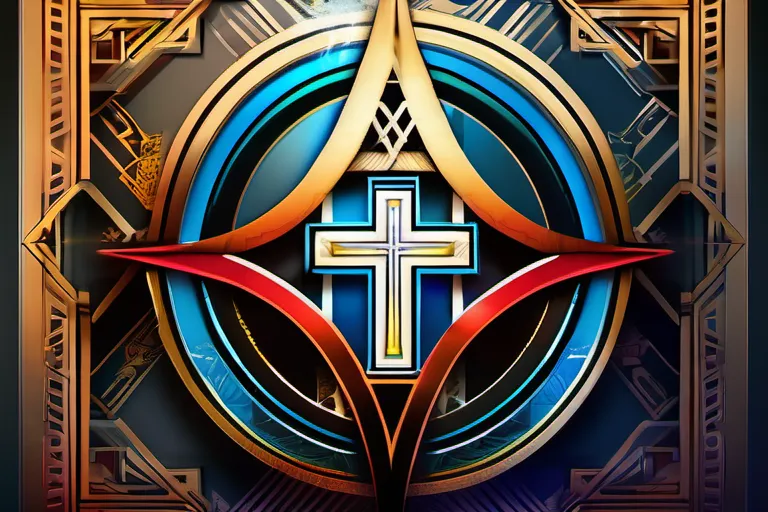Exploring the Intersection of Faith, Culture, and Pop Culture
In today’s world, religion and entertainment often intersect in ways that can be both enlightening and controversial. This article delves into the complex relationship between these two powerful forces, examining their points of convergence and conflict.
The Role of Religion in Entertainment Throughout History
Throughout history, religion has been intertwined with entertainment, much like the threads of a tapestry that weave together to form a rich and vibrant picture. Have you ever wondered how ancient biblical epics have influenced modern-day films? The role of religion in shaping our cultural narratives is profound, almost as if it’s a timeless river flowing through the veins of human civilization.
Consider the grandeur of films like The Ten Commandments or The Passion of the Christ. These cinematic masterpieces not only entertain but also serve as vehicles for religious teachings. They remind us that the stories we watch are not just fantasies, but echoes of our collective past. How can these films be seen purely as entertainment when they delve so deeply into themes of faith and redemption?
Even in the realm of music, songs like Amazing Grace or hymns sung during services share a common thread with pop hits that echo religious sentiments. Are these songs merely about love and joy, or do they carry an underlying message of spiritual awakening? It’s fascinating to ponder how much our cultural tastes are shaped by the beliefs we hold dear.
In literature too, think of the impact of works like The Divine Comedy by Dante Alighieri. This epic poem is a religious journey through hell, purgatory, and heaven, yet it’s also a profound exploration of human nature and morality. Does this mean that every piece of entertainment we consume has a hidden layer of religious significance?
As we navigate the complexities of modern-day media, it’s important to question whether there is truly a conflict between religion and entertainment. Perhaps the true conflict lies in how these stories are told and consumed. Do they challenge us or merely distract? The intersection of faith and culture continues to evolve, much like a living organism adapting to its environment. In this ever-changing landscape, we must explore these questions with open minds and hearts.
So, as you watch the latest blockbuster or listen to your favorite song, ask yourself: Are there religious themes at play here? And if so, what message are they conveying?
The Impact of Religious Themes on Popular Culture
How do religious themes intertwine with popular culture, and what impact does this have on society? It’s almost like weaving a tapestry where every thread represents a different aspect of human experience. From biblical epics to modern-day dramas, these threads come together in ways that can both enrich our understanding of the world and spark heated debates.
Consider the blockbuster movie The Da Vinci Code. This film explores religious themes with such boldness that it raised eyebrows among many religious communities. Was it a provocative narrative or a dangerous dissection of centuries-old beliefs? The impact was undeniable; it sparked discussions, disagreements, and even led to increased interest in historical and theological studies.
Similarly, the TV series Miracle Worker, which tells the story of Helen Keller’s relationship with her teacher Annie Sullivan, weaves through themes of faith, resilience, and human dignity. This show not only entertains but also educates viewers on the importance of religious values in shaping personal and social relationships.
But is it always a positive influence? What about the controversial TV series The Leftovers, which delves into post-apocalyptic themes that involve faith, loss, and the search for meaning? Some critics argue that its exploration of religion might be too dark or sensationalist. Yet, others see it as a necessary reflection on human suffering and the search for hope in despair.
These examples illustrate how religious themes can serve both constructive and controversial roles in popular culture. They challenge us to question our beliefs, engage with complex narratives, and reflect on the broader social implications of entertainment that touches upon deeply held values.
Religious Controversies in Entertainment: Cases and Analysis
Have you ever wondered if there’s a hidden battle between religion and entertainment, where one constantly tries to undermine the other? Take the film The Da Vinci Code; it sparked intense controversy for its portrayal of Jesus Christ in a way that challenged traditional Christian beliefs. Was this just artistic license or did it cross into sacrilege?
Or consider the television series Jessie, where the character Jessie is named after Joseph, the husband of Mary, mother of Jesus. Some viewers found this naming choice insensitive and disrespectful to religious traditions, while others saw it as a harmless homage to biblical figures.
These instances highlight how religious themes can become contentious ground when they enter popular culture. It’s like planting seeds in a garden—some flourish into beautiful blooms, but others may wither or even cause harm if not handled carefully. In the case of The Da Vinci Code, the film became a catalyst for heated debates about faith and reason, with some churches banning screenings while others used it as an opportunity to engage with younger generations.
Meanwhile, shows like Jessie face a different kind of scrutiny. The choice to name a character after Joseph, which is common in many cultures, can sometimes be seen through a religious lens, especially if the show’s audience includes people from diverse backgrounds. This makes every episode a potential minefield, requiring sensitivity and care in handling sensitive topics.
These conflicts raise questions about the role of religion in society today. Are we living in an era where every piece of entertainment must tread carefully to avoid offending religious sensibilities? Or is it possible for faith and culture to coexist harmoniously, even when they clash occasionally?
The answer might lie somewhere between these extremes. It’s not about eradicating religious themes from popular culture but finding a balance that respects all viewpoints while enriching our shared cultural experience.
The Role of Entertainment in Religious Propaganda
Entertainment has always been a powerful tool, capable of shaping our perceptions and influencing our beliefs. But what happens when this influence veers into religious propaganda? Is there a fine line between using entertainment to spread cultural values and pushing a specific religious agenda?
Imagine a film that glorifies a certain faith, portraying its followers as morally superior and all other religions as inferior. Could such content be seen as more than just storytelling? Many would argue that when entertainment becomes a vehicle for spreading one’s beliefs, it treads dangerously close to propaganda. This raises the question: How can we distinguish between cultural promotion and religious advocacy in films, TV shows, and even social media?
Consider the metaphor of a garden. Just as flowers in a garden compete for sunlight, different religions also vie for attention in today’s world. When one religion uses entertainment to overshadow others, it creates an uneven playing field. Does this not dilute the authenticity of each faith? Isn’t it crucial that every voice is heard equally, without being marginalized or amplified at the expense of others?
The role of entertainment in religious propaganda goes beyond just content creation; it also influences how we perceive different beliefs. A viewer who identifies with a particular character’s journey might adopt their values more readily. This dynamic highlights the ethical responsibility that creators and producers have to ensure their work respects diverse perspectives.
However, the challenge lies in balancing artistic freedom with cultural sensitivity. Can entertainment truly exist without any form of bias or agenda? Or is it inevitable that every creative work carries some level of perspective shaping? As we navigate this complex landscape, one thing remains clear: the line between cultural representation and religious propaganda is thinner than a spider’s web.
Balancing Artistic Freedom and Religious Sensitivity
When artists venture into creating work that delves into religious themes, they find themselves walking on a tightrope between artistic freedom and cultural sensitivity. How can one explore the depths of faith without offending those who hold their beliefs dear? Is it possible to strike a balance that honors both the creative spirit and the delicate nature of religious traditions?
Imagine a painter trying to capture the essence of divinity in her canvas, only to risk alienating devout viewers who see their faith as sacred. Or consider a playwright crafting a narrative centered around religious figures, where every word might be scrutinized for its potential impact. The challenges are numerous and multifaceted.
Artists often face the dilemma of whether to tread lightly or boldly in exploring religious themes. On one hand, they want to push boundaries and express their vision freely; on the other, they must consider the cultural nuances that could cause offense. How can an artist balance these competing pressures? Is it possible to create meaningful art without crossing a line?
Consider the metaphor of a delicate flower, carefully placed in a garden where every petal symbolizes a sensitive belief. Each artist must handle this with care, ensuring that their work blossoms into something beautiful and resonant, rather than withering under the weight of controversy.
The key lies in dialogue and understanding. Artists need to engage with religious communities, seek feedback, and make informed decisions about how to represent complex spiritual ideas. By doing so, they can maintain their artistic integrity while showing respect for those whose beliefs are central to their lives.
In the end, it’s not just about creating art; it’s about fostering a space where faith and creativity can coexist harmoniously. The challenge is immense, but the potential rewards—in terms of deepening cultural understanding and fostering meaningful conversations—are immeasurable.
The Future of Religion and Entertainment: Predictions and Implications
The future of religion and entertainment seems to be like two ships sailing on the same ocean but rarely meeting, yet both are constantly influenced by each other’s movements. Will they eventually collide? Or will they drift apart, leaving a trail of mixed signals behind them?
As technology continues to advance, it opens up new possibilities for the intersection between religion and entertainment. Imagine virtual reality experiences that transport you into the heart of a sacred site or an interactive film that explores religious teachings through engaging storytelling. The question is: Will these innovations lead to greater understanding and harmony, or will they exacerbate existing tensions?
The challenge lies in finding common ground where faith meets pop culture. Can we create content that resonates with both believers and non-believers? Should entertainment be a tool for spreading spiritual messages, or should it remain purely for enjoyment without religious undertones? The answers to these questions are not clear-cut, but they will shape the future of how religion is perceived in the entertainment industry.
Moreover, as global populations become more interconnected through digital platforms, the influence of one culture’s religious views on another can be profound. Will this lead to a homogenization of beliefs or foster an appreciation for diversity? The implications are vast, touching on issues such as cultural appropriation and the preservation of unique traditions.
The future is both exciting and uncertain. As we navigate these waters, it’s crucial to keep dialogue open and inclusive, ensuring that no voice is silenced in the quest to bridge the gap between religion and entertainment. What do you think the future holds for this dynamic relationship? Will they find a way to coexist peacefully or will conflicts arise, creating waves of controversy?
Conclusion
 Ultimately, it is clear that while there may be areas of tension between religion and entertainment, they also have the potential to enrich each other in profound ways. By understanding this dynamic, we can foster a more nuanced appreciation for both.
Ultimately, it is clear that while there may be areas of tension between religion and entertainment, they also have the potential to enrich each other in profound ways. By understanding this dynamic, we can foster a more nuanced appreciation for both.











